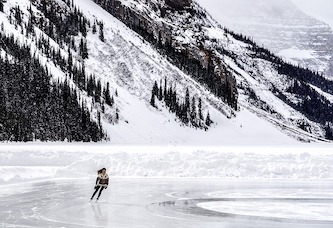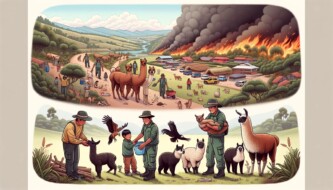Something really cool happened in Alaska’s Alpine lakes recently. A guy who teaches people how to rescue others from ice, Luc Mehl, and his wife got to skate on something called an “ice window.” This is a super rare event that only happens once every ten years. The ice on Rabbit Lake froze in a special way that made it see-through, so they could see through it while they skated. It was possible because the weather was really cold and dry when winter started.
There’s a video of them skating on the ice, and it looks amazing. They’re gliding around on the ice, and you can see the beautiful frozen landscape all around them. Mehl, who teaches people about the outdoors, said it was really exciting and felt like a dream. The “ice window” let them see what was under the frozen lake, which is something most people don’t get to see.
This kind of thing is super rare. It only happens once every ten years because the weather has to be just right. The ice has to be really thin and see-through. It’s a really cool sight because you can skate on the lake and still see what’s below. People from all over the world have seen the video and think it’s amazing. They want to see it for themselves and think it’s brave of the couple to skate on such delicate ice.
This experience shows us how awesome nature can be. It reminds us that we should take care of the Earth and appreciate these rare things. The “ice window” in Alaska’s Alpine lakes is something that people will remember for a long time.
Original news source: Skating on a once-in-a-decade ‘ice window’ in Alaska (BBC)
Listen
Slow
Normal
Fast
Group or Classroom Activities
Warm-up Activities:
– News Summary
Instructions: Divide the class into small groups. Each group must summarize the article in their own words, focusing on the main points: the rare “ice window” phenomenon, the experience of Luc Mehl and his wife, and the significance of this event. Afterward, each group will present their summary to the class.
– Opinion Spectrum
Instructions: Line up the students on an ‘opinion spectrum’ from one side of the room to the other based on how much they agree or disagree with a statement about the article. For example, “Skating on thin ice is worth the risk to experience rare natural phenomena.” Students move to a spot on the line that represents their opinion, then discuss their position with the person next to them.
– Keyword Taboo
Instructions: Write down keywords from the article (e.g., Alaska, ice window, skate, rare, nature, Earth) on separate pieces of paper. Students take turns drawing a word and describing it to the class without using the word itself or any variations of it. The other students have to guess the word.
– Future Predictions
Instructions: Have the students work individually or in pairs to make predictions about the future of natural phenomena like the “ice window.” They should consider climate change, human activity, and natural cycles. Students can share their predictions with the class and discuss the implications for the environment.
– Think-Pair-Share
Instructions: Pose a question related to the article, such as “What does the ‘ice window’ tell us about the importance of preserving natural wonders?” Students first think individually about their answer, then pair up with a classmate to discuss their thoughts, and finally, share their conclusions with the wider class.
Comprehension Questions:
1. What unique event took place in Alaska’s Alpine lakes that is described as really cool?
2. Who is Luc Mehl and what did he and his wife experience on Rabbit Lake?
3. How often does the event known as an “ice window” occur?
4. Why was the ice on Rabbit Lake see-through?
5. What could Luc Mehl and his wife see while they were skating on the lake?
6. Why is the “ice window” considered to be a rare phenomenon?
7. What reaction did people from around the world have after seeing the video of the couple skating?
8. What does the article suggest we should do in response to witnessing such rare natural events?
Go to answers ⇩
Listen and Fill in the Gaps:
Something really cool happened in Alaska’s Alpine (1)______ recently. A guy who (2)______ people how to rescue others from ice, Luc Mehl, and his wife got to skate on something (3)______ an “ice window.” This is a super rare (4)______ that only happens once every ten years. The ice on Rabbit Lake froze in a special way that made it see-through, so they could see through it while they skated. It was possible because the (5)______ was really cold and dry when winter (6)______.
There’s a video of them skating on the ice, and it looks amazing. They’re gliding around on the ice, and you can see the beautiful frozen landscape all around them. Mehl, who teaches people about the (7)______, said it was really (8)______ and felt like a dream. The “ice window” let them see what was under the frozen lake, which is some(9)______ most people don’t get to see.
This kind of thing is super rare. It only happens once every ten years because the weather has to be just right. The ice has to be really thin and see-through. It’s a really cool (10)______ because you can (11)______ on the lake and still see what’s below. People from all over the (12)______ have seen the (13)______ and (14)______ it’s amazing. They want to see it for themselves and think it’s (15)______ of the couple to skate on such delicate ice.
This experience (16)______ us how awesome nature can be. It reminds us that we should take care of the Earth and appreciate these rare things. The “ice window” in Alaska’s Alpine lakes is something that people will remember for a long time.
Go to answers ⇩
Discussion Questions:
Students can ask a partner these questions, or discuss them as a group.
1. What is an “ice window” and have you ever seen something like it?
2. How would you feel if you had the chance to skate on crystal-clear ice?
3. Do you like to go ice skating? Why or why not?
4. Do you think it’s brave to skate on thin ice, even if you can see through it?
5. Have you ever experienced something in nature that made you feel like you were dreaming?
6. What’s the most amazing natural event you’ve ever seen or heard about?
7. Why do you think people are so fascinated by rare natural phenomena?
8. If you could visit Alaska to see the “ice window,” would you go? Why or why not?
9. How important do you think it is to protect rare natural sights like the “ice window”?
10. Have you ever seen a video of a natural wonder that made you want to visit that place?
11. What kind of weather do you think is needed to create an “ice window”?
12. Do you think activities like skating on a frozen lake are safe? Why or why not?
13. Can you think of any other activities that allow you to see nature in a unique way?
14. What’s the coolest thing you’ve ever done or want to do in the winter?
15. Why do you think people should appreciate and take care of the Earth?
Individual Activities
Vocabulary Meanings:
Match each word to its meaning.
Words:
1. cool
2. rare
3. skate
4. see-through
5. landscape
6. sight
7. delicate
8. appreciate
Meanings:
(a) To glide or slide on ice or a smooth surface
(b) Something that is really awesome or impressive
(c) Something that is visually pleasing or interesting
(d) Fragile or easily broken or damaged
(e) Transparent or able to be seen through
(f) The view or scenery of a particular area
(g) Something that doesn’t happen very often
(h) To value or recognize the worth of something
Go to answers ⇩
Multiple Choice Questions:
1. How often does the “ice window” event occur in Alaska’s Alpine lakes?
(a) Once every ten years
(b) Once every five years
(c) Once every two years
(d) Once every year
2. What is an “ice window”?
(a) A rare event where the ice on a lake becomes see-through
(b) A special type of window made out of ice
(c) A popular tourist attraction in Alaska
(d) A type of ice sculpture
3. What allowed Luc Mehl and his wife to skate on the “ice window”?
(a) The lake being frozen solid
(b) The lake being shallow
(c) The weather being cold and dry
(d) The weather being warm and humid
4. What did Luc Mehl say about skating on the “ice window”?
(a) It was scary and dangerous
(b) It was boring and not worth it
(c) It was disappointing and not as cool as expected
(d) It was really exciting and felt like a dream
5. Why is the “ice window” event considered rare?
(a) Because it happens every year
(b) Because the weather conditions have to be just right
(c) Because it only occurs in Alaska
(d) Because it is a man-made phenomenon
6. What can you see through the “ice window” while skating?
(a) The reflection of the sky
(b) The beautiful frozen landscape
(c) The bottom of the lake
(d) The fish swimming underneath
7. How have people from all over the world reacted to the video of the “ice window”?
(a) They think it’s boring and overrated
(b) They think it’s dangerous and irresponsible
(c) They think it’s amazing and want to see it for themselves
(d) They think it’s a hoax and not real
8. What does the “ice window” experience teach us about nature?
(a) It reminds us to be careful around ice
(b) It teaches us about the importance of skating
(c) It encourages us to stay indoors during winter
(d) It shows us how awesome nature can be
Go to answers ⇩
True or False Questions:
1. The couple’s experience was not captured in a video, showcasing their clumsy skating on the see-through ice and the unimpressive frozen landscape surrounding them.
2. The video of the couple skating on the “ice window” has gained no international attention, with people from all over the world being unimpressed by it and expressing a lack of desire to witness it themselves.
3. An “ice window” is a phenomenon that occurs only once every ten years, where the ice on a lake becomes transparent, allowing people to see through it while skating.
4. This phenomenon is extremely rare and requires specific weather conditions, including very cold and dry conditions at the start of winter, for the ice to become thin and transparent.
5. The “ice window” provided a unique perspective, allowing them to see what lay beneath the frozen lake, which is not something most people get to witness.
6. Luc Mehl, who teaches indoor skills, described the experience as incredibly mundane and nightmarish.
7. This extraordinary natural occurrence serves as a reminder of the beauty and wonder of nature, emphasizing the importance of caring for the Earth and appreciating its rare phenomena.
8. A couple in Alaska recently had the common opportunity to skate on an “ice window” in one of the state’s Alpine lakes.
Go to answers ⇩
Write a Summary:
Write a summary of this news article in two sentences.
Check your writing now with the best free AI for English writing!
Writing Questions:
Answer the following questions. Write as much as you can for each answer.
Check your answers with our free English writing assistant!
1. What unique phenomenon did Luc Mehl and his wife experience while skating on Rabbit Lake in Alaska?
2. How often does the “ice window” event occur in Alaska’s Alpine lakes, according to the article?
3. Why was the ice on Rabbit Lake see-through, making the “ice window” possible?
4. What did the video of Luc Mehl and his wife show, and why do people find it so fascinating?
5. What message does the author convey about nature and the environment through the story of the “ice window”?
Answers
Comprehension Question Answers:
1. What unique event took place in Alaska’s Alpine lakes that is described as really cool?
A super rare “ice window” event happened where the ice froze in a way that made it see-through.
2. Who is Luc Mehl and what did he and his wife experience on Rabbit Lake?
Luc Mehl is a guy who teaches ice rescue, and he and his wife got to skate on the clear, see-through ice of Rabbit Lake.
3. How often does the event known as an “ice window” occur?
The “ice window” occurs once every ten years.
4. Why was the ice on Rabbit Lake see-through?
The ice was see-through because the weather was very cold and dry when winter started, which caused the ice to freeze without snow or bubbles, making it clear.
5. What could Luc Mehl and his wife see while they were skating on the lake?
They could see what was beneath the frozen surface of the lake while they were skating.
6. Why is the “ice window” considered to be a rare phenomenon?
The “ice window” is rare because it requires specific weather conditions to form thin, clear ice, which doesn’t happen often.
7. What reaction did people from around the world have after seeing the video of the couple skating?
People from around the world thought the video was amazing and expressed a desire to see the “ice window” for themselves, considering the couple brave for skating on such delicate ice.
8. What does the article suggest we should do in response to witnessing such rare natural events?
The article suggests that we should take care of the Earth and appreciate these rare natural events.
Go back to questions ⇧
Listen and Fill in the Gaps Answers:
(1) lakes
(2) teaches
(3) called
(4) event
(5) weather
(6) started
(7) outdoors
(8) exciting
(9) thing
(10) sight
(11) skate
(12) world
(13) video
(14) think
(15) brave
(16) shows
Go back to questions ⇧
Vocabulary Meanings Answers:
1. cool
Answer: (b) Something that is really awesome or impressive
2. rare
Answer: (g) Something that doesn’t happen very often
3. skate
Answer: (a) To glide or slide on ice or a smooth surface
4. see-through
Answer: (e) Transparent or able to be seen through
5. landscape
Answer: (f) The view or scenery of a particular area
6. sight
Answer: (c) Something that is visually pleasing or interesting
7. delicate
Answer: (d) Fragile or easily broken or damaged
8. appreciate
Answer: (h) To value or recognize the worth of something
Go back to questions ⇧
Multiple Choice Answers:
1. How often does the “ice window” event occur in Alaska’s Alpine lakes?
Answer: (a) Once every ten years
2. What is an “ice window”?
Answer: (a) A rare event where the ice on a lake becomes see-through
3. What allowed Luc Mehl and his wife to skate on the “ice window”?
Answer: (c) The weather being cold and dry
4. What did Luc Mehl say about skating on the “ice window”?
Answer: (d) It was really exciting and felt like a dream
5. Why is the “ice window” event considered rare?
Answer: (b) Because the weather conditions have to be just right
6. What can you see through the “ice window” while skating?
Answer: (b) The beautiful frozen landscape
7. How have people from all over the world reacted to the video of the “ice window”?
Answer: (c) They think it’s amazing and want to see it for themselves
8. What does the “ice window” experience teach us about nature?
Answer: (d) It shows us how awesome nature can be
Go back to questions ⇧
True or False Answers:
1. The couple’s experience was not captured in a video, showcasing their clumsy skating on the see-through ice and the unimpressive frozen landscape surrounding them. (Answer: False)
2. The video of the couple skating on the “ice window” has gained no international attention, with people from all over the world being unimpressed by it and expressing a lack of desire to witness it themselves. (Answer: False)
3. An “ice window” is a phenomenon that occurs only once every ten years, where the ice on a lake becomes transparent, allowing people to see through it while skating. (Answer: True)
4. This phenomenon is extremely rare and requires specific weather conditions, including very cold and dry conditions at the start of winter, for the ice to become thin and transparent. (Answer: True)
5. The “ice window” provided a unique perspective, allowing them to see what lay beneath the frozen lake, which is not something most people get to witness. (Answer: True)
6. Luc Mehl, who teaches indoor skills, described the experience as incredibly mundane and nightmarish. (Answer: False)
7. This extraordinary natural occurrence serves as a reminder of the beauty and wonder of nature, emphasizing the importance of caring for the Earth and appreciating its rare phenomena. (Answer: True)
8. A couple in Alaska recently had the common opportunity to skate on an “ice window” in one of the state’s Alpine lakes. (Answer: False)
Go back to questions ⇧













